英语将来时
- 格式:pptx
- 大小:348.30 KB
- 文档页数:11
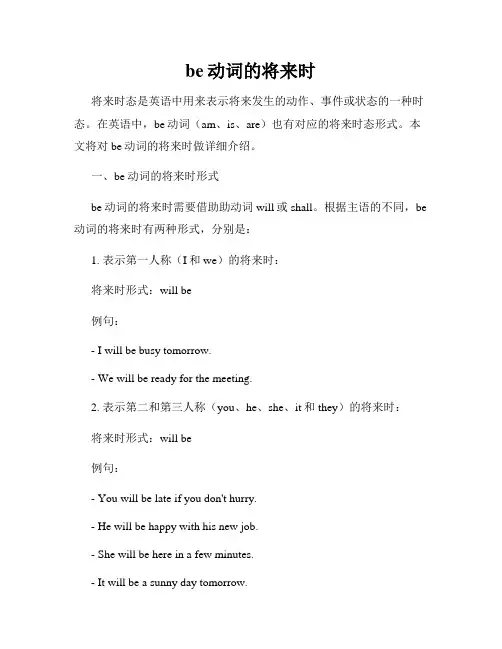
be动词的将来时将来时态是英语中用来表示将来发生的动作、事件或状态的一种时态。
在英语中,be动词(am、is、are)也有对应的将来时态形式。
本文将对be动词的将来时做详细介绍。
一、be动词的将来时形式be动词的将来时需要借助助动词will或shall。
根据主语的不同,be 动词的将来时有两种形式,分别是:1. 表示第一人称(I和we)的将来时:将来时形式:will be例句:- I will be busy tomorrow.- We will be ready for the meeting.2. 表示第二和第三人称(you、he、she、it和they)的将来时:将来时形式:will be例句:- You will be late if you don't hurry.- He will be happy with his new job.- She will be here in a few minutes.- It will be a sunny day tomorrow.- They will be wearing uniforms at the ceremony.二、be动词的将来时用法1. 表示未来的状态或行为be动词的将来时可以用来表示人或事物在将来的某个时间点的状态或行为。
例句:- The train will be crowded during rush hour.- The flowers will be in bloom next month.- She will be tired after a long day at work.- They will be on vacation next week.2. 表示预测或猜测be动词的将来时还可以用来表示对未来的预测或猜测。
例句:- It will be a difficult task to complete.- He will be the winner of the competition.- They will be successful in their new business venture.- The weather will be nice tomorrow.3. 表示意愿或打算be动词的将来时还可以用来表示意愿或打算。
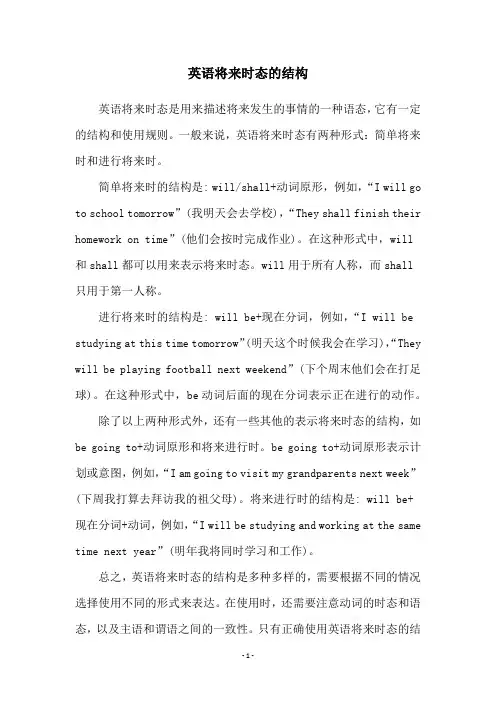
英语将来时态的结构英语将来时态是用来描述将来发生的事情的一种语态,它有一定的结构和使用规则。
一般来说,英语将来时态有两种形式:简单将来时和进行将来时。
简单将来时的结构是: will/shall+动词原形,例如,“I will go to school tomorrow”(我明天会去学校),“They shall finish their homework on time”(他们会按时完成作业)。
在这种形式中,will和shall都可以用来表示将来时态。
will用于所有人称,而shall只用于第一人称。
进行将来时的结构是: will be+现在分词,例如,“I will be studying at this time tomorrow”(明天这个时候我会在学习),“They will be playing football next weekend”(下个周末他们会在打足球)。
在这种形式中,be动词后面的现在分词表示正在进行的动作。
除了以上两种形式外,还有一些其他的表示将来时态的结构,如be going to+动词原形和将来进行时。
be going to+动词原形表示计划或意图,例如,“I am going to visit my grandparents next week”(下周我打算去拜访我的祖父母)。
将来进行时的结构是: will be+现在分词+动词,例如,“I will be studying and working at the same time next year”(明年我将同时学习和工作)。
总之,英语将来时态的结构是多种多样的,需要根据不同的情况选择使用不同的形式来表达。
在使用时,还需要注意动词的时态和语态,以及主语和谓语之间的一致性。
只有正确使用英语将来时态的结构和规则,才能让我们清楚地表达将来的意图和计划。
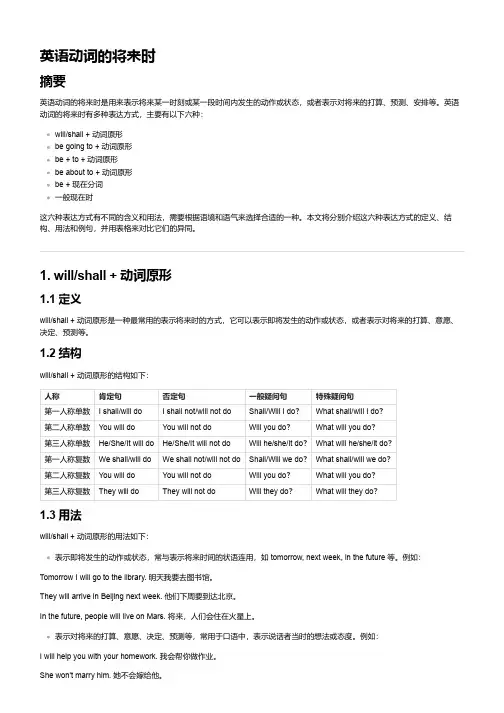
英语动词的将来时摘要英语动词的将来时是用来表示将来某一时刻或某一段时间内发生的动作或状态,或者表示对将来的打算、预测、安排等。
英语动词的将来时有多种表达方式,主要有以下六种:will/shall + 动词原形be going to + 动词原形be + to + 动词原形be about to + 动词原形be + 现在分词一般现在时这六种表达方式有不同的含义和用法,需要根据语境和语气来选择合适的一种。
本文将分别介绍这六种表达方式的定义、结构、用法和例句,并用表格来对比它们的异同。
1. will/shall + 动词原形1.1 定义will/shall + 动词原形是一种最常用的表示将来时的方式,它可以表示即将发生的动作或状态,或者表示对将来的打算、意愿、决定、预测等。
1.2 结构will/shall + 动词原形的结构如下:人称肯定句否定句一般疑问句特殊疑问句第一人称单数I shall/will do I shall not/will not do Shall/Will I do?What shall/will I do?第二人称单数You will do You will not do Will you do?What will you do?第三人称单数He/She/It will do He/She/It will not do Will he/she/it do?What will he/she/it do?第一人称复数We shall/will do We shall not/will not do Shall/Will we do?What shall/will we do?第二人称复数You will do You will not do Will you do?What will you do?第三人称复数They will do They will not do Will they do?What will they do?1.3 用法will/shall + 动词原形的用法如下:表示即将发生的动作或状态,常与表示将来时间的状语连用,如 tomorrow, next week, in the future 等。
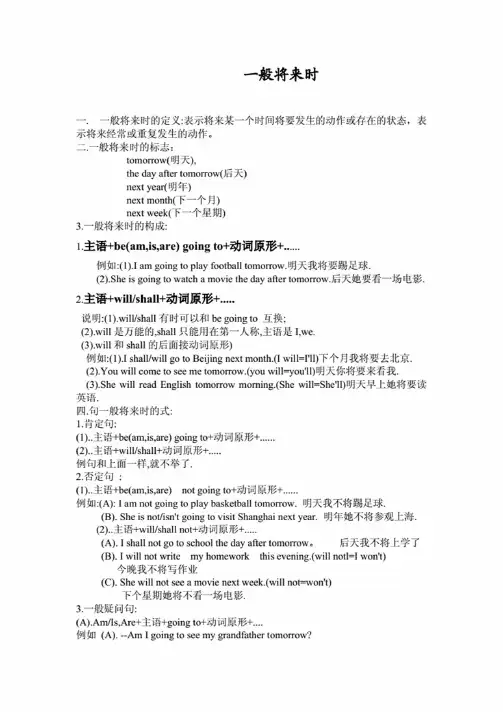
一般将来时一.一般将来时的定义:表示将来某一个时间将要发生的动作或存在的状态,表示将来经常或重复发生的动作。
二.一般将来时的标志:tomorrow(明天),the day after tomorrow(后天)next year(明年)next month(T—个月)next week(下一个星期)3.一般将来时的构成:1.主语^be(am,is,are)going to+动词原形+..例如:(1).I am going to play football tomorrow.明天我将要踢足球.(2).She is going to watch a movie the day after tomorrow.后天她要看一场电影.2.主语+will/shall+动词原形+.....说明:(l).will/shall有时可以和be going to互换;(2) .will是万能的,shall只能用在第一人称,主语是I,we.(3) .will和shall的后而接动词原形)例如shall/will go to Beijing next month.。
will=I11)下个月我将要去北京.(2) .You will come to see me tomorrow.(you will=you'll)明天你将要来看我.(3) .She will read English tomorrow moming.(She will=She'll)明天早上她将要读英语.四.句一般将来时的式:1.肯定句:(1) ..主语+be(am,is,are)going to+动词原形+......(2) ..主语+will/shall+动词原形+.....例句和上面一样,就不举了.2.否定句:(1)..主语+be(am,is,are)not going to+动词原形+......例如:(A):I am not going to play basketball tomorrow.明天我不将踢足球.(B).She is not/isn't going to visit Shanghai next year.明年她不将参观上海.(2)..主语+will/shall not+动词原形+.....(A).I shall not go to school the day after tomorrow o后天我不将上学了(B).I will not write my homework this evening.(will notl=I won't)今晚我不将写作业(C).She will not see a movie next week.(will not=won't)下个星期她将不看一场电影.3.一般疑问句:(A).Am/Is,Are+主语+going to+动词原形+....例如(A).—Am I going to see my grandfather tomorrow?明天我将去看我的爷爷吗?—Yes,you are.是的,你将去.(B).— Are you going to listening to the tape tomorrow?明天你将听录音带吗?—No,I am not.不,我不将.(C). —Is she going to Beijing next year? 明年我将去北京吗?-Yes,she is.是的,她将.(2).Will//shall+主语+动词原形+…例如(A). —Shall we play volleyball next class?下一节课我们将打排球吗?-Yes,you will,是的,你们将.(B). —Will you come here next week?下个星期你将来这儿吗?-Yes,I will.是的,我将.(C).--Will she teach us this term?这学期,她将教我们吗?—Yes,she will.是的,她将.4.特殊疑问句:(1).What(Where,How...)+be(am,is,are)+主语+going to+动词原形+...?例如:(A).—What are you going to do tomorrow? 明天你将要做什么?—rm going to the park? 我将要去动物园.(B).--Where are you going to swim? 你将要去哪儿游泳?—I'm going to swim in the river.(2). What(When,Where,How...)+主语+动词原形+...?例如:(A).---What will you do next week?下个星期你将要做什么?--1 will do my homeworko 我将要做作业.(B).—How will she come here tomorrow?明天她将要怎么来这儿?—She will come here by bus 。

英语将来时的几种表达法分别是什么一般将来时表示将来某个时间要发生的动作或存在的状态,也表示将来经常或反复发生的动作,常与表示将来的时间状语连用。
一般将来时的表示方法有多种形式。
例如:will / shall +动词原形;be going to+动词原形;be+v. ing;be to(be about to)+动词原形结构等。
英语将来时的几种表达法1英语将来时的表达法be going to +动词原形表示主语现在的意图或打算在最近将要做的事情。
shall/will + 动词原形shall 只能用于第一人称I/We, will可以用于任何人称,如果是You and I 作为主语时,也用will.值得注意的是:be going to 和will 略有不同,be going to 表示事先经过考虑的打算,而will多表示意愿、决心。
以下这个句子不能用will进行替换(详细的两者区别,下次再详述,这里不再赘述)be + to do(动词原形)主要表示按计划或安排将要做的事情。
be about to do(动词原形)表示就要做或者正好要做某事,后面也可与when 连用,暗示时间上的巧合。
be +doing (现在分词)某些表示趋向性的瞬间动词,如come,go ,leave,arrive,begin,start,stop,close,open,die,join,borrow,buy可以用进行时的形式来表示将来的概念,现在进行时表一般将来,过去进行时表过去将来。
2一般将来时标志性词汇tomorrow 明天the day after tomorrow 后天next week/year 下周、明年in the future 在将来the day after tomorrow 后天this evening/afternoon/ year今天晚上、今天下午、今年before long 不久以后next year/month/week/summer 明年、下个月、下星期、明年夏天in the future,some day 未来、将来的某一天in two weeks/days/years 两(周、天、年)后。
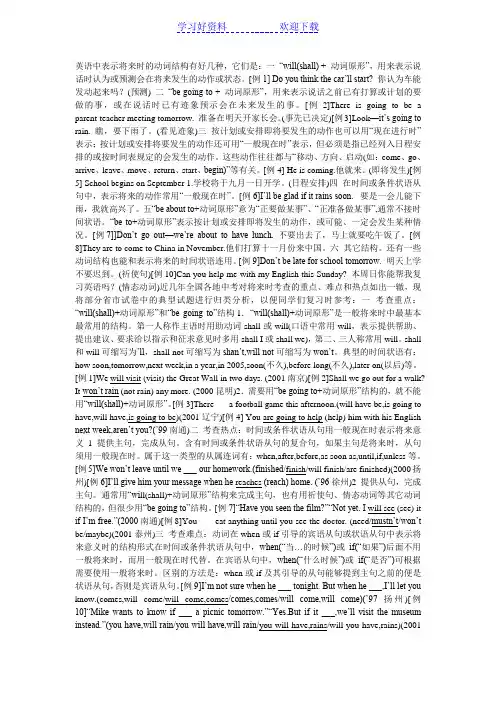
英语中表示将来时的动词结构有好几种,它们是:一“will(shall) + 动词原形”,用来表示说话时认为或预测会在将来发生的动作或状态。
[例1] Do you think the car’ll start? 你认为车能发动起来吗?(预测) 二“be going to + 动词原形”,用来表示说话之前已有打算或计划的要做的事,或在说话时已有迹象预示会在未来发生的事。
[例2]There is going to be a parent-teacher meeting tomorrow. 准备在明天开家长会。
(事先已决定)[例3]Look—it’s going to rain. 瞧,要下雨了。
(看见迹象)三按计划或安排即将要发生的动作也可以用“现在进行时”表示;按计划或安排将要发生的动作还可用“一般现在时”表示,但必须是指已经列入日程安排的或按时间表规定的会发生的动作。
这些动作往往都与“移动、方向、启动(如:come、go、arrive、leave、move、return、start、begin)”等有关。
[例4] He is coming.他就来。
(即将发生)[例5] School begins on September 1.学校将于九月一日开学。
(日程安排)四在时间或条件状语从句中,表示将来的动作常用“一般现在时”。
[例6]I’ll be glad if it rains soon.要是一会儿能下雨,我就高兴了。
五“be about to+动词原形”意为“正要做某事”、“正准备做某事”,通常不接时间状语。
“be to+动词原形”表示按计划或安排即将发生的动作,或可能、一定会发生某种情况。
[例7]]Don’t go out—we’re about to have lunch. 不要出去了,马上就要吃午饭了。
[例8]They are to come to China in November.他们打算十一月份来中国。


16种英语时态一般将来时表示将要发生的动作或存在的状态及打算,计划或准备做1.时间状语:tomorrow.next day.soon.in a few minutes.by·the day after tomorrow2.基本结构:主+am/is./are+going to +do,will/shall+do否定式:am/is/are+not going to+do, will/shall+not do一般疑问句:be+·will/shall+·3.基本用法:[1]a.表示将来时间的动作或状况Eg:they are going to have a competition with us in studies.B.用于真实条件句和时间状语从句的主句中表示将来的情况Eg:i’ll tell you as soon as he comesC.用于条件状语从句表示愿望或意愿Eg:if you will wait for me,i shall come back soonD.表示一种倾向或习惯性动作Eg:the shop won’t openn until nine.[2]a.be going to+v原(表示打算或准备好要做的事或有迹象表明要发生的事情)Eg:what are you going to do during the summer holidayB.be+v-ing 有些v的现在进行时表示将要发生的动作,表示按计划或安排即将发生的事情,如:go come leave start arrive Eg:jenny is coming to supper this evening.C.be to +v原表示约定命令或按计划要做的事情D.be about to +v原表示将要马上Eg:he is about toleave附加:1.be going to ---- be toBe to 表示客观安排或受人指示而做某事Eg:i am to play football tomorrowBe going to 表示主观的打算或计划Eg:i am going to play football tomorrow2.be going to ---- will用于条件句时,be going to 表将来will表意愿eg:if you are going to make a journey,you’d better get ready for it as soon as possibleNow if you will take off your clothes,we will fit the new clothes on you in front of the mirror.。
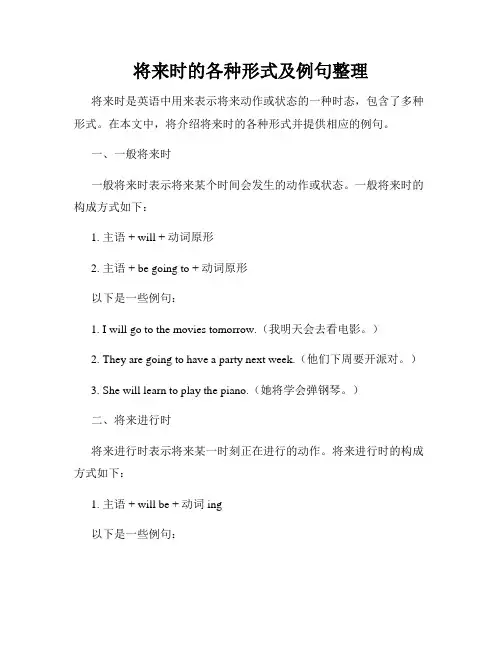
将来时的各种形式及例句整理将来时是英语中用来表示将来动作或状态的一种时态,包含了多种形式。
在本文中,将介绍将来时的各种形式并提供相应的例句。
一、一般将来时一般将来时表示将来某个时间会发生的动作或状态。
一般将来时的构成方式如下:1. 主语 + will + 动词原形2. 主语 + be going to + 动词原形以下是一些例句:1. I will go to the movies tomorrow.(我明天会去看电影。
)2. They are going to have a party next week.(他们下周要开派对。
)3. She will learn to play the piano.(她将学会弹钢琴。
)二、将来进行时将来进行时表示将来某一时刻正在进行的动作。
将来进行时的构成方式如下:1. 主语 + will be + 动词ing以下是一些例句:1. They will be watching a movie at this time tomorrow.(明天此时他们将在看电影。
)2. She will be working on her project tomorrow morning.(明天早上她将在进行项目工作。
)三、将来完成时将来完成时表示将来某一时刻之前已经完成的动作。
将来完成时的构成方式如下:1. 主语 + will have + 过去分词以下是一些例句:1. By the time he arrives, I will have finished my homework.(等他到达时,我将已经完成作业。
)2. They will have left for Paris by the end of this month.(到本月末,他们将已经去巴黎了。
)四、将来完成进行时将来完成进行时表示将来某一时刻之前已经开始并且一直在进行的动作。
将来完成进行时的构成方式如下:1. 主语 + will have been + 动词ing以下是一些例句:1. By the time they arrive, we will have been waiting for three hours.(等他们到达时,我们将已经等待了三个小时。
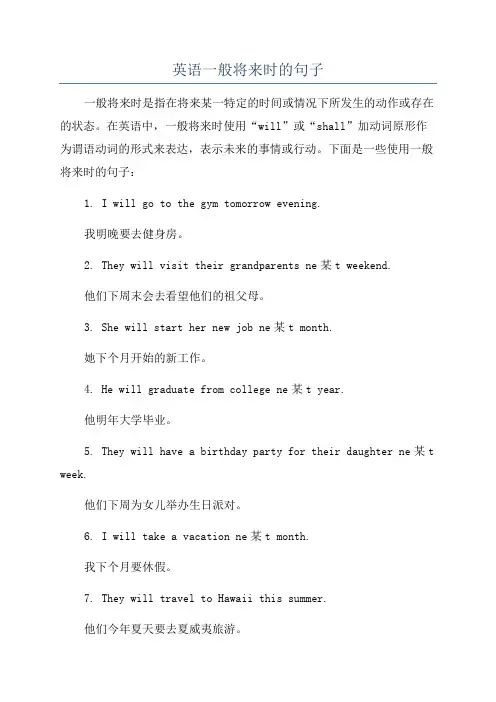
英语一般将来时的句子一般将来时是指在将来某一特定的时间或情况下所发生的动作或存在的状态。
在英语中,一般将来时使用“will”或“shall”加动词原形作为谓语动词的形式来表达,表示未来的事情或行动。
下面是一些使用一般将来时的句子:1. I will go to the gym tomorrow evening.我明晚要去健身房。
2. They will visit their grandparents ne某t weekend.他们下周末会去看望他们的祖父母。
3. She will start her new job ne某t month.她下个月开始的新工作。
4. He will graduate from college ne某t year.他明年大学毕业。
5. They will have a birthday party for their daughter ne某t week.他们下周为女儿举办生日派对。
6. I will take a vacation ne某t month.我下个月要休假。
7. They will travel to Hawaii this summer.他们今年夏天要去夏威夷旅游。
8. She will buy a new car in the near future.她未来会买一辆新车。
9. He will meet his friends at the restaurant tonight.他今晚会在餐厅里和他的朋友见面。
10. They will move to a new city ne某t year.他们明年会搬到一个新城市。
11. She will start a new chapter in her life soon.她很快将会开启人生的新篇章。
12. He will finish his project by the end of the week.他将在本周末完成他的项目。
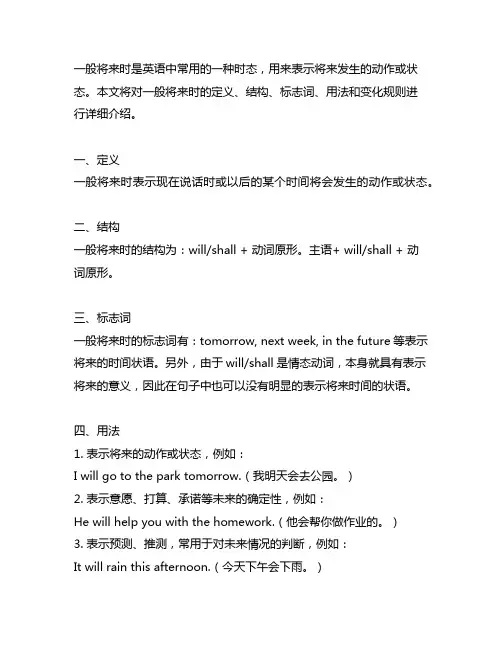
一般将来时是英语中常用的一种时态,用来表示将来发生的动作或状态。
本文将对一般将来时的定义、结构、标志词、用法和变化规则进行详细介绍。
一、定义一般将来时表示现在说话时或以后的某个时间将会发生的动作或状态。
二、结构一般将来时的结构为:will/shall + 动词原形。
主语+ will/shall + 动词原形。
三、标志词一般将来时的标志词有:tomorrow, next week, in the future等表示将来的时间状语。
另外,由于will/shall是情态动词,本身就具有表示将来的意义,因此在句子中也可以没有明显的表示将来时间的状语。
四、用法1. 表示将来的动作或状态,例如:I will go to the park tomorrow.(我明天会去公园。
)2. 表示意愿、打算、承诺等未来的确定性,例如:He will help you with the homework.(他会帮你做作业的。
)3. 表示预测、推测,常用于对未来情况的判断,例如:It will rain this afternoon.(今天下午会下雨。
)五、变化规则1. 肯定句的一般将来时结构为:will/shall + 动词原形。
例如:She wille to see me tomorrow.(她明天会来看我。
)2. 否定句的一般将来时结构为:will/shall + not + 动词原形。
例如:I will not go to the party tonight.(我今晚不会去参加派对。
)3. 疑问句的一般将来时结构为:will/shall + 主语+ 动词原形。
例如:Will youe to the meeting tomorrow?(你明天会来参加会议吗?)以上就是关于一般将来时的定义、结构、标志词、用法和变化规则的详细介绍。
希望对您有所帮助。
一般将来时是英语中最常用的一种时态之一,用于表示将来会发生的动作或状态。
英语一般将来时的五种表达方法英语一般将来时的五种表达方法一般将来时表示将来某个时间要发生的动作或存在的状态,也表示将来经常或反复发生的动作。
常常与表示将来的时间状语连用。
常用的表达形式共有五种,现归纳如下:一、用will或shall表示。
“助动词will或shall+动词原形”这一形式,表示将来发生的事情,用于征求对方的意见或表示客气的邀请。
在口语中will用于所有人称,书面语中第一人称常用shall。
如:1.TomorrowwillbeSunday.明天就是星期天。
3.Shallwegothereatfive?我们五点钟去那儿,好吗?4.Willyoupleaseopenthedoor?请你把门打开,好吗?二、用begoingto结构表示。
“begoingto+动词原形”用来表示近期或事先考虑过的`将要发生的动作以及已有迹象表明必将发生某事,意为“打算;就要”。
如:1.We”regoingtomeetoutsidetheschoolgate.我们打算在校门口见面。
2.Look!It”sgoingtorain.瞧!快下雨了。
三、用现在进行时表示。
表示位置转移的动词(如:go,come,leave,start,arrive等),可用现在进行时表示将来时。
如:1.UncleWangiscoming.王叔叔就要来了。
2.They”releavingforBeijing.他们即将前往北京。
四、用一般现在时表示。
根据规定或时间表预计要发生的动作,在时间和条件状语从句中,都可用一般现在时表示将来时。
如:1.Thenewtermstarts(begins)onAugust29th.新学期八月二十九日开学。
2.Ifitdoesn”traintomorrow,we willgooutforapicnic.如果明天不下雨,我们将出去野餐。
五、用“be+动词不定式”或用“beaboutto+动词原形”的结构表示。
如:1.HeistovisitJapannextyear.明年他将访问日本。
动词的将来时一般将来时:一般将来时的定义:一般将来时表示在现在时间以后的时间(将来)里要发生的事或情况。
常与表示将来时间的如next week, tomorrow, in the future等时间状语连用。
(回顾过去时)2.一般将来时的句型结构:(1)主语+will/shall+动词原形① shall一般用于第一人称,常用于疑问句,表示征求对方意见。
(shall we…?/ shall I…?)例如: Shall I carry your bag?(表示征求意见)Shall we go to the museum next Sunday?(表示询问情况)练习:我们现在走吗?我要记下电话号码吗?will可用于各种人称表示将要发生的动作,情况,状态,或意愿。
例如: She will come tomorrow.She will be a perfect wife in the future.How long will the meeting last?否定形式:will not/ won’t例如:You won’t be the first one to come.疑问句: Will +主语…?例如:Will he help you to finish your homework?练习:下星期他会举办一个生日派对, 你会来吗? ---不,我不会。
(2)be going to+动词原形be going to和will都可以表示“打算,将要做某事”,一般可以互换。
例如:I will do my homework tomorrow.I am going to do my homework tomorrow.注意:①表示客观上必然会发生的事时,不宜用“be going to+动词原形”。
例如:Tomorrow will be Friday. (正确)Tomorrow is going to be Friday. (错误)②be going to可以表示说话人根据已有的事实,认为某事将要发生。
英语一般将来时的五种表达方法英语一般将来时的五种表达方法一般将来时表示将来某个时间要发生的动作或存在的状态,也表示将来经常或反复发生的.动作。
常常与表示将来的时间状语连用。
常用的表达形式共有五种,现归纳如下:“助动词will或shall+动词原形”这一形式,表示将来发生的事情,用于征求对方的意见或表示客气的邀请。
在口语中will用于所有人称,书面语中第一人称常用shall。
如:1. Tomorrow will be Sunday. 明天就是星期天。
2. The rain will stop soon. 很快就要停了。
3. Shall we go there at five? 我们五点钟去那儿,好吗?4. Will you please open the door? 请你把门翻开,好吗?“be going to+动词原形”用来表示近期或事先考虑过的将要发生的动作以及已有迹象说明必将发生某事,意为“打算;就要”。
如:1. We”re going to meet outside the school gate. 我们打算在校门口见面。
2. Look! It”s going to rain. 瞧!快下雨了。
表示位置转移的动词(如:go, e, leave, start, arrive 等),可用现在进展时表示将来时。
如:1. Uncle Wang is ing. 王叔叔就要来了。
2. They”re leaving for Beijing. 他们即将前往北京。
根据规定或时间表预计要发生的动作,在时间和条件状语从句中,都可用一般现在时表示将来时。
如:1. The new term starts (begins) on August 29th. 新学期八月二十九日开学。
2. If it doesn”t rain tomorrow, we will go out for a piic. 如果明天不下雨,我们将出去野餐。
英语一般将来时的句型结构
一般将来时的结构有4种:
1、主语+will/shall+动词原形。
2、主语+am/is/are+going+to+动词原形。
3、主语
+am/is/are+to+动词原形。
4、主语+am/is/are+现在分词。
下面举例说明:
1、一般将来时表示将要发生的动作或情况。
例如:Will you be free tonight?你今晚有空吗?
2、有时表示将来时间的状语,有时没有时间状语,这时要从意思上判断是否指未来的动作或情况。
例如:Will she come?她(会)来吗?
3、在以第一人称I或we作主语的问句中,一般使用助动词shall,这时或是征求对方的意见,或是询问一个情况(b):Shall we have any classes tomorrow?明天我们有课吗?。
将来时的英语作文怎么写英语作文将来时结构及范文:结构一般将来时: be going to ,will .,shall .,be to do sth ,be about to do sth.一、will / shall +动词原形这种方法单纯的表示将来某个时间将要发生的动作或存在的状态.一般将来时常用的时间状语: tomorrow,the day after tomorrow ,next year ,till the w eekend ,in an hour ,after that ,next week ,from now on ,in the future Will 用于各种人称,shall只用于第一人称,例如: I will / shall go to visit him next week .What time shall we go there tomorrow英语作文将来时结构及范文篇1 This Sunday,l am going to watch a football match with Jack.As the match willbegin at three o'clock in the afternoon,Jack is going to meet me at my house at two o'clock.Then we are going to take a bus to the stadium.The journey will take about half an hour.After that,we are going to buy some snacks in the snack shop outside the stadium.I think I am going to have an enjoyable day.这个星期天,我会与杰克去观看一场足球比赛.由於比赛将於当日下午三时举行,杰克会在下午2时到我家跟我会合.然后我们会乘巴士到体育场.全程行车需时约半小时.下车后,我们打算在体育场外的小吃店买一些零食才入场.我相信我会有一个愉快的星期天.篇2 Tomorrow I'll be on a plane flying to Toronto. I am going to see the Blue Jay s' baseball game. I will probably arrive in the morning at 10 am and the game wil I start at 12 sharp. After the game I will go to a restaurant to eat. If I have some s pare time by the end of the day I will be most likely visiting my old friend Albert.Then I will catch the plane at 8pm to fly back to Montreal. I hope it's going to be an exiting day.篇3 Another new term comes again,so i should have a study plan to promote my self.First,i descide to finish my homework more carefully than before.And pay mo re attention to the knowledge which i didn't know it clearly.Second,i will do a lot of read to widen the range of my knowledge.and try to combine thoery to practice.Finally,i will learn to adjust,to be more positive and more helpful.That's what i plant to do in a new term!。
初中英语一般将来时知识点一般将来时表示将来某个时间要发生的动作或存在的状态,也表示将来经常或反复发生的动作。
常常与表示将来的时间状语连用。
常用的表达形式共有五种,现归纳如下:用will或shall表示“助动词will或shall+动词原形”这一形式,表示将来发生的事情,用于征求对方的意见或表示客气的邀请。
在口语中will用于所有人称,书面语中第一人称常用shall【其实will也可以用到】。
如:1. Tomorrow will be Sunday. 明天就是星期天。
2. The rain will stop soon. 雨很快就要停了。
3. Shall we go there at five? 我们五点钟去那儿,好吗?4. Will you please open the door? 请你把门打开,好吗?用be going to结构表示“be going to+动词原形”用来表示近期或事先考虑过的将要发生的.动作以及已有迹象表明必将发生某事,意为“打算;就要”。
如:1. We're going to meet outside the school gate. 我们打算在校门口见面。
2. Look! It's going to rain. 瞧!快下雨了。
用现在进行时表示表示位置转移的动词(如:go, come, leave, start, arrive等),可用现在进行时表示将来时。
如:1. Uncle Wang is coming. 王叔叔就要来了。
2. They're leaving for Beijing. 他们即将前往北京。
用一般现在时表示根据规定或时间表预计要发生的动作,在时间和条件状语从句中,都可用一般现在时表示将来时。
如:1. The new term starts (begins) on August 29th. 新学期八月二十九日开学。
2. If it doesn't rain tomorrow, we will go out for a picnic. 如果明天不下雨,我们将出去野餐。